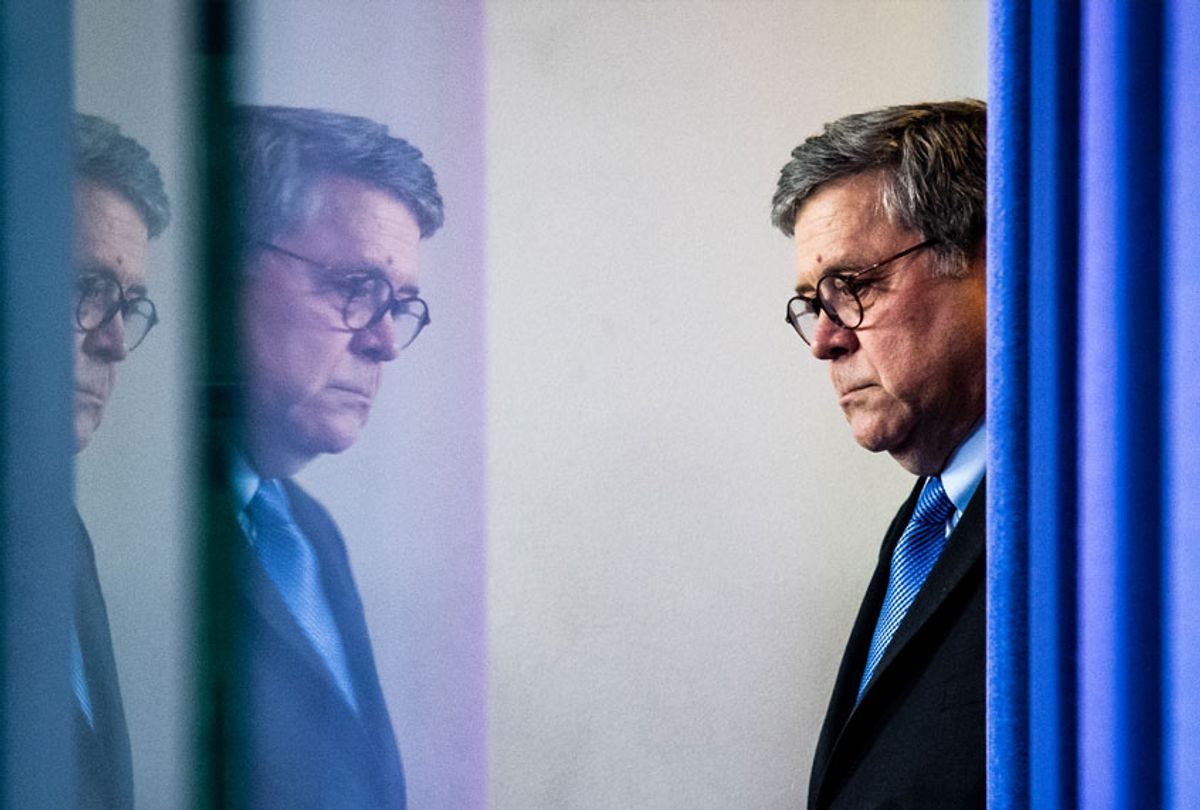William Barr attempted to undermine prosecutors in longtime Trump "fixer" Michael Cohen's case shortly after he was sworn in as attorney general, numerous sources told The New York Times.
Cohen pleaded guilty in 2018 to tax evasion and campaign finance violations after admitting to paying $130,000 to adult film actress Stormy Daniels at the direction of then-candidate Donald Trump, who was referred to as "Individual-1" in court documents. But Barr sought to intervene in the case right after he became attorney general, at which time Cohen had already been sentenced to three years in prison, according to The Times.
Barr "spent weeks" last spring questioning prosecutors over their decision to charge Cohen with campaign finance violations. Barr argued, among other things, that the matter should have been brought to the Federal Election Commission instead.
He instructed officials at the Justice Department to write a memo raising legal questions seeking to undercut the conviction, all according to the report. The order was similar to the ones he gave before the Justice Department intervened in the cases of longtime Trump adviser Roger Stone and former national security adviser Michael Flynn, which also stemmed from special counsel Robert Mueller's investigation.
But a Justice Department official told The Times that Barr did not order the case to be withdrawn since there was little he could do to affect the sentence after the fact and was met with pushback from prosecutors in New York.
Though Trump was referred to in Cohen's case, the Justice Department has a decades-old policy which precludes a current president from being indicted. Local prosecutors in New York later seized on the campaign finance issue and issued a subpoena for Trump's tax returns in the case. The Supreme Court is currently reviewing the case.
The move foreshadowed Barr's later interference in cases, which led prosecutors to quit Stone's case en masse. After the Cohen saga, Barr and other officials communicated that "The Southern District needs to be reined in," according to The Times.
Former federal prosecutor Elie Honig called the report "absolutely outrageous."
Barr ultimately moved to fire Geoffrey Berman, who was appointed as the U.S. attorney for the Southern District of New York after Trump fired Obama holdover Preet Bharara. Berman, who also investigated Rudy Giuliani and others in the president's orbit, refused to leave, arguing that Barr did not have the authority to fire him because he was appointed by a federal court. He ultimately stepped down when Barr said the order came directly from Trump. However, Trump denied that he had anything to do with the matter.
The firing, on the heels of repeated interventions into cases related to the president, drew impeachment threats from House Democrats.
"I think the weight of the evidence and of what's happened leads to that conclusion," House Judiciary Chairman Jerry Nadler, D-N.Y., told reporters earlier this week.
Barr is expected to testify before Nadler's committee next month after the panel threatened to issue a subpoena to compel his testimony following repeated delays.
Aaron Zelinsky, a former Mueller prosecutor who quit Stone's case after Barr's intervention, testified Wednesday to the committee that the office overseeing the case was under "heavy pressure from the highest levels of the Department of Justice" to cut Stone "a break."
"I was also told that the acting U.S. attorney was giving Stone such unprecedentedly favorable treatment, because he was 'afraid of the president,'" he said.
Barr insisted in a Thursday interview with NPR that there was no "pattern" to show he had acted on behalf of the president's agenda.
Barr argued that the "media narrative" has "misrepresented" his actions as "suspicious."
"I certainly was aware that given the current environment, anytime you make a personnel move, you know, conspiracy theorists will suggest that there's something — there's some ulterior motive involved," he said. "But I felt this was actually a good time to do it, because I was not aware of anything that should, in reality, give rise to that."
Barr added that Berman was "living on borrowed time from the beginning," because he was not appointed by Trump.
But former federal prosecutor Daniel Goldman questioned why Barr had "lied when he said Berman stepped down," noting that he had also "lied about the Mueller report."
Sen. Kamala Harris, D-Calif., said that Congress must immediately investigate why "Trump and Barr wanted Berman out so badly." Sen. Elizabeth Warren, D-Mass., said Barr should resign or be impeached over the "naked abuse of power."
Former Justice Department officials urged the report about Cohen to be looked at, as well, because the "scheme implicated Trump."
"Why would Barr attack the legal theory underpinning the conviction of someone who had already turned on Trump?" Matthew Miller, a former Justice Department spokesman, asked on Twitter. "Because that same theory would've been crucial to charging Trump, his business and one of his top execs."

Shares